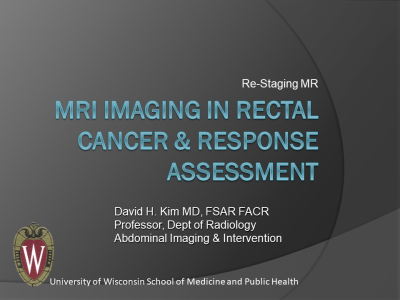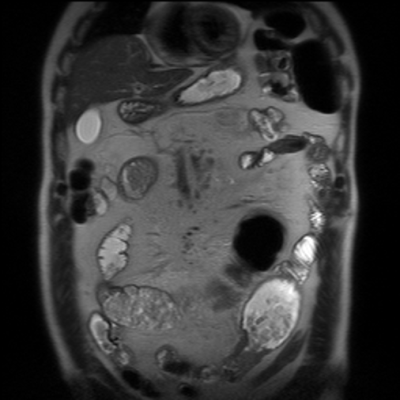Weekday Course
Gut Feeling on MRI: Gastrointestinal Imaging
ISMRM & ISMRT Annual Meeting & Exhibition • 03-08 June 2023 • Toronto, ON, Canada

| 08:35 | Magnetic Resonance of the Gut: How Do I Do It? Current Status & Future Trends Bari Dane | |
| 08:55 | MRI in IBD: Diagnosis, Burden & Treatment Response: Recent Advances David Grand | |
| 09:15 |
 |
MRI Imaging in Rectal Cancer & Response Assessment
David Kim
Keywords: Body: Digestive Rectal MR is central to the management of rectal cancer patients, driving management at initial presentation and after neo-adjuvant therapy. After neoadjuvant therapy at re-staging MRI, the issue of residual tumor versus post treatment fibrosis is of primary importance where ‘watch and wait’ without surgical resection is possible for a complete clinical response. Optimizing the MR protocol, including the addition of intra-rectal gel, can improve both T2W and DWI images which are core to distinguishing between residual tumor and fibrosis. In addition, knowledge of lymph node drainage patterns can augment the accuracy of lymph node status. |
| 09:35 |
 |
MRI in Small & Large Bowel Tumours: One-Stop Shop
Andrea Laghi
Keywords: Body: Digestive In current clinical practice, MR imaging plays a limited role in the study of small and large bowel tumors, if we exclude rectal cancer. In fact, most patients with either a suspected small bowel neoplasm or with a need of colon cancer staging is referred to a MDCT evaluation. However, high soft tissue contrast, multiplanar imaging acquisition, as well as the possibility of performing functional studies make MR a promising technique to study these diseases. The possibility of using MRI in assessing small and large bowel tumors depends on the unmet clinical needs which cannot be fully satisfied by MDCT. |
| 09:55 |
MRI Imaging in Vasculitis, Ischemia, Weaning Away from CT
Jeff Fidler
Keywords: Body: Digestive, Body: Body, Cardiovascular: Angiography Patients with ischemia or vasculitis involving the bowel usually present with acute abdominal pain and are imaged with CT. However, there are several scenarios where MR may be utilized or preferred. This presentation will discuss MR protocol optimization to efficiently diagnose these conditions, explain the pathophysiology and imaging findings of these entities, and review differential diagnoses. |
|
| 10:15 | MRI Services for Upper GI Tract: Are We There Yet ? Sonal Krishan |
The International Society for Magnetic Resonance in Medicine is accredited by the Accreditation Council for Continuing Medical Education to provide continuing medical education for physicians.